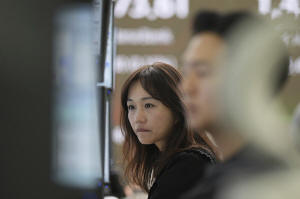Asian shares fall as Nvidia, other tech companies are walloped by US
controls on AI chips
[April 16, 2025] By
ELAINE KURTENBACH
BANGKOK (AP) — World shares were mostly lower Wednesday as Nvidia and
other technology companies were walloped by tighter U.S. controls on
exports of advanced computer chips used for artificial intelligence.
The future for the S&P 500 skidded 1.2% while that for the Dow Jones
Industrial Average lost 0.6%.
Chip maker Nvidia’s shares fell 6.3% in after-hours trading after it
said the U.S. had imposed stricter controls on its exports of one of its
computer chips designed for use in artificial intelligence. Rival chip
maker AMD's shares dropped 7.1% after U.S. markets closed.
Trade war concerns also were revived by a Trump administration
announcement of an investigation into imports of critical minerals such
as rare earths, which are used in smart phones, electric vehicles and
many other products.
In early European trading, Britain's FTSE 100 lost 0.2% to 8,233.10
after the government said inflation in the U.K. fell for the second
month running in March largely as a result of lower gas prices.
Germany's DAX fell 0.7% to 21,107.68, while the CAC 40 in Paris gave up
0.6% to 7,289.67.
Stocks in China led the regional declines after the Chinese government
reported the world’s second largest economy grew at a strong 5.4% annual
rate in the last quarter, helped by strong industrial production, retail
sales and exports. But in quarterly terms, growth slowed to 1.2% in
January-March from 1.6% in the last quarter of 2024.

Hong Kong's Hang Seng dropped 2% to 20,922.54, while the Shanghai
Composite index regained lost ground, edging 0.1% higher to 3,271.19.
Private sector economists have been downgrading their forecasts after
President Donald Trump recently pushed his tariffs on most imports from
China to 145%, while China raised its duties on imports from the U.S. to
125%.
Analysts at ANZ Research said activity in the current quarter is already
weakening.
“Our view is that the tariff shock is caused by the unpredictability
rather than the tariff itself. President Trump’s announcements have
affected business sentiment and activity,” Raymond Yeung and other ANZ
researchers said in a report after the China data was released.

[to top of second column] |

Hana Bank employees watch computer monitors at a foreign exchange
dealing room in Seoul, South Korea, Wednesday, April 16, 2025. (AP
Photo/Lee Jin-man)
 In Tokyo, the Nikkei 225 index shed
1% to 33,920.40, pulled lower by big tech companies like chip
testing equipment maker Advantest, whose shares dropped 6.6% and
Disco Corp. which plunged 8%.
South Korea's Kospi fell 1.2% to 2,447.43, while in Australia, the
S&P/ASX 200 edged less than 0.1% lower to 7,758.90.
India's Sensex was little changed and Bangkok's SET edged 0.1%
lower.
On Tuesday, U.S. stocks drifted, with the S&P 500 slipping 0.2% and
the Dow down 0.4%. The Nasdaq composite edged less than 0.1% lower.
Uncertainty over President Donald Trump's tariffs kept investors
watching to see what comes next.
The U.S. bond market appeared to calm after its sudden and sharp
moves last week shook confidence in the status of U.S. government
bonds as a safe haven against risks.
The yield on the 10-year Treasury was steady at 4.33%, down from
4.38% late Monday and 4.48% at the end of last week. A week earlier
it had been at just 4.01%. Yields usually drop when investors are
jittery, so this week’s moves have offered reassurance.
The value of the U.S. dollar also steadied after tumbling last week,
raising more worries that Trump’s trade war also may be undermining
its status as a safe-haven investment.
Palantir Technologies climbed 6.2% for a second day of gains after
NATO said it would use the company’s artificial-intelligence
capabilities in its allied command operations.
In other dealings early Wednesday, U.S. benchmark crude oil lost 69
cents to $60.64 per barrel, while Brent crude, the international
standard, fell 65 cents to $64.01 per barrel.
Trump's tariffs have raised expectations that economies will slow,
denting demand for oil and other resources.
The U.S. dollar fell to 142.26 Japanese yen from 143.24 yen. The
euro rose to $1.1377 from $1.1283.
All contents © copyright 2025 Associated Press. All rights reserved |